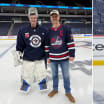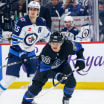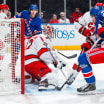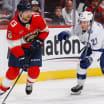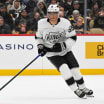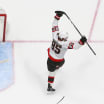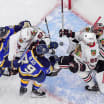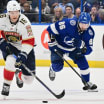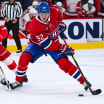Mahovlich cherishes collection from Hall of Fame career, reflects on life
'Big M' shows off countless artifacts highlighting playing days of 6-time Stanley Cup champion
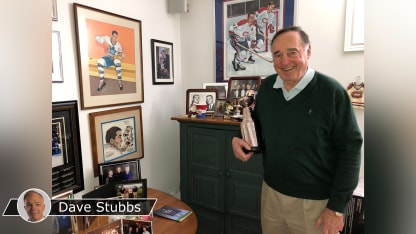
"It's September 1971 in Victoria and we're out in British Columbia, playing exhibition games in training camp," he begins of his first full season with the Montreal Canadiens. "Guy had just been drafted No. 1 overall that June and we all know how great he'd turn out to be.
"Well, we're roommates, in Victoria's Empress Hotel, and I said to him, 'This is nice, let's have breakfast here and look out into the harbor.' We call room service, breakfast arrives, and then we see this fellow, a window-washer, hanging five floors up.
"I said to Guy, 'Why don't we invite him in to have breakfast with us?'"
Frank Mahovlich in an early 1960s portrait with the Toronto Maple Leafs. Turofsky/Hockey Hall of Fame
Mahovlich had long been a legend, 15 seasons into his Hall of Fame-bound NHL career. His 27 points in the 1971 Stanley Cup Playoffs (14 goals, 13 assists in 20 games) had paced the Canadiens to the championship four months earlier.
Hanging from his harness, the window-washer instantly recognized the "Big M," if not the future legend sitting with him, and happily accepted the invitation, crawling inside to join Mahovlich and Lafleur for breakfast.
"I've often wondered whether that window-washer remembered joining us that day," he says with a grin.
History will note that Mahovlich was the last Canadiens player to wear No. 10 before Lafleur pulled it on for his rookie season. Acquired by trade from the Detroit Red Wings on Jan. 13, 1971, the Big M joined his new team in Minnesota for their Jan. 14 game. Without his familiar No. 27 in the Canadiens sweater trunk, he was given No. 10, just vacated by traded forward Bill Collins. He wore No. 27 two nights later back home in Montreal.
Frank Mahovlich as a member of the Montreal Canadiens during an early-1970s game. Getty Images
Now, over his leisurely lunch of lemon garlic chicken, a glass of Pinot Grigio and a cup of black tea, then an impromptu hour-long tour of his home -- "Marie, I've brought a guest home," he announces to his wife as we walk inside -- Mahovlich is recounting one story after another, each as remarkable as the life of the man who has lived them.
Lunch had been scheduled; the visit to his home had not, and he apologizes for the salt stains of winter on his car's floor mats as we make the short drive from the restaurant.
To walk into Mahovlich's basement is to step into the life of a hockey icon and former Canadian Senator, a worldly gentleman who at 85 is still stopped for photos and autographs in his adopted home of Toronto and far beyond.
The Big M played 18 NHL seasons with the Toronto Maple Leafs, Red Wings and Canadiens between 1956-74, winning the Stanley Cup four times with Toronto and then twice with Montreal, scoring 1,103 points (533 goals, 570 assists) in 1,181 regular-season games and 118 points (51 goals, 67 assists) in 137 playoffs games.
Frank Mahovlich as a member of Team Canada for the 1972 Summit Series, and in a late 1960s portrait with the Detroit Red Wings. Graphic Artists/Hockey Hall of Fame; James McCarthy/ Hockey Hall of Fame
Voted the 1957-58 Calder Trophy winner as the NHL rookie of the year, the forward retired from hockey in 1978 following four seasons in the World Hockey Association and a starring role for Canada in the 1972 Summit Series, elected to the Hockey Hall of Fame in 1981.
In 1998, he was appointed to the Senate of Canada, the Upper House of Parliament, serving until his retirement in 2013. Three years later he was voted No. 9 on the list of the 100 all-time greatest Maple Leafs for the team's hundredth season, preceding his being named in 2017 among the 100 Greatest NHL Players for the League's Centennial year.
Mahovlich had accepted an invitation to lunch in Toronto between Games 1 and 2 of the Eastern Conference First Round series between the Maple Leafs and Tampa Bay Lightning.
Like all in "Leafs Nation," he was shaking his head at Toronto's 7-3 loss in Game 1, saying that he'd be taking two grandsons to Game 2, the first time he'd been to Scotiabank Arena in as long as he could remember. That would be a 7-2 Maple Leafs victory.
Frank Mahovlich (left) and Red Kelly after the Toronto Maple Leafs' 1967 Stanley Cup victory, which was Mahovlich's fourth, Kelly's eighth; Mahovlich with trainer Tommy Nayler during the same celebration. Hockey Hall of Fame; Frank Prazak/Hockey Hall of Fame
Though Toronto defeated Tampa Bay in six games to advance to the second round for the first time since 2004 after a 2-1 overtime win Saturday, Mahovlich warns Maple Leafs fans not to get too excited at the prospects of advancing far into the playoffs.
"I'm afraid that my sister, Anne, placed a hex on the Maple Leafs when I was traded," he joked, general manager Punch Imlach having dealt him to Detroit in a multi-player blockbuster on March 3, 1968. "She said that as long as I was alive, the Maple Leafs would never again win the Stanley Cup."
The Big M was a member of Toronto's last four championships, in 1962, 1963, 1964 and 1967; he added two more with the Canadiens in 1971 and 1973.
Mahovlich's feud with Imlach is legendary, the GM's psychological abuse destroying the big forward's will to play.
"My first three years, Punch was OK," he recalls, a 6½-season nightmare to follow. "I agreed with a lot of the things he did, he made the trade for Red Kelly (his late, lifelong friend). Then I scored 48 goals (in 1960-61)."
Mahovlich's contract was up at the end of 1961-62 and he sought a raise "to $25,000 or something."
Frank Mahovlich (center) with coach Punch Imlach, captain George Armstrong and Mahovlich's 100th goal puck, scored Jan. 25, 1961 at Maple Leaf Gardens during 5-3 win against the visiting Montreal Canadiens. Imperial Oil-Turofsky/Hockey Hall of Fame
The Maple Leafs offered him an insulting token increase and he left camp and went home.
"(Assistant GM King) Clancy called me and said, 'Come back, we'll negotiate.' But things were never the same after that, finally leading to the trade to Detroit," he recalls.
The plot thickened on the eve of the 1962 All-Star Game in Toronto when Chicago Black Hawks owner James Norris offered the Maple Leafs $1 million for Mahovlich, who was unsigned but still Toronto property. Maple Leafs co-owner Harold Ballard was warm to the idea but ultimately team chairman Conn Smythe quashed the deal, and the Big M quickly signed for $110,000 over four years.
"Years later, after I'm retired, Smythe is sitting in his car at the racetrack and he sends his chauffeur to place a bet," the Big M says. "Smythe gets out of the car and comes to me to apologize for letting Harold Ballard take over from Conn's son, Stafford."
That water is well under the bridge, Mahovlich today adored in Toronto as a supreme gentleman and gigantic talent whose deceptively powerful skating meshed with his dazzling stickhandling and a wonderful touch around the net.
Frank Mahovlich with his wife, Marie, and their son, Michael, at Maple Leaf Gardens with the Stanley Cup and various trophies on May 5, 1967. Graphic Artists/Hockey Hall of Fame
He is wearing two rings to lunch, each with a diamond, on battle-scarred hands whose fingers are angled in directions that nature never intended.
"This one is from 1962, updated with each new championship in Toronto," Mahovlich says of what's worn on his right hand.
He smiles tightly at the mention of Ballard, the bombastic and tight-fisted late co-owner of the Maple Leafs whose thick wallet shared space with the moths that escaped when he opened it.
"A quarter-carat diamond was set in the ring for the first Cup," the Big M says. "When we won again in 1963, that diamond was removed and a half-carat was placed. The same for 1964, up to three-quarters of a carat. Finally, in 1967, a full carat."
It goes without saying that Mahovlich, and his teammates, were not given the diamonds that were extracted each time.
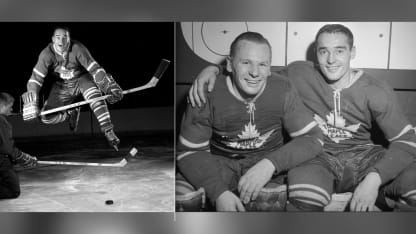
Frank Mahovlich in in a playful on-ice portrait, and with goalie Johnny Bower in 1959. Turofsky; Imperial Oil-Turofsky/Hockey Hall of Fame
On his left hand is a Canadiens ring his family had made through the team to celebrate his 1973 Cup, the original lost to theft.
Mahovlich flips through a gallery of digital photos on a reporter's iPad, beginning with one of the 1962 Maple Leafs.
"Holy smokes, all the guys who are gone," he says, taking somber inventory.
All seven executives in the photo are deceased, as are 15 of the 21 players.
Mahovlich brightens upon recognizing the late Eddie Shack in the back row, then immediately spins another yarn, he and his rambunctious teammate having refereed a charity hockey game in Toronto on Nov. 18, 1963 between City Council members and a press, radio and TV team.
The 1961-62 Toronto Maple Leafs, winners of their first of three consecutive Stanley Cup championships, the first of the career six won by Frank Mahovlich. Bottom row, from left: Bert Olmstead, coach/GM Punch Imlach, Ron Stewart, president Conn Smythe, George Armstrong, co-owner Stafford Smythe, Tim Horton, co-owner Harold Ballard, Allan Stanley, assistant GM King Clancy, Dick Duff. Middle row: trainer Bob Haggert, Carl Brewer, Billy Harris, Bob Nevin, Johnny Bower, Bob Pulford, Bobby Baun, Don Simmons, equipment manager Tommy Naylor. Back row: Dave Keon, Larry Hillman, Red Kelly, Frank Mahovlich, Ed Litzenberger, Al Arbour, Eddie Shack, John MacMillan. MacDonald Stewart/Hockey Hall of Fame
"Al Boliska, one of Toronto radio's loudmouths of the time, was playing for the media and the starting goalie for the other team was Donald Summerville, Toronto's mayor, who played goal as a kid (and for a time was a Maple Leafs practice goalie)," he begins.
"Boliska and his guys wanted to stage a fight and the mayor, who had heart problems, said, 'I can't, I just want to make an appearance.' The game starts and the mayor makes three or four great saves. Holy geez, he's up and down. All of a sudden he heads for the bench and Boliska says, 'If we don't jump him now, he'll be gone.' So they jumped him."
Summerville made it to the dressing room and collapsed, rushed to hospital where he died.
"I cancel the game," Mahovlich says, unaware at that moment of the gravity of Summerville's condition. "I'm in the dressing room and the organizer says, 'Frank, you can't cancel the game.' I said, 'The mayor came out, made an appearance then he keeled over. You've got to show a little respect,' and the organizer says, 'If you were in Montreal, playing for the Stanley Cup and NHL President Clarence Campbell dies in the stands, would you cancel the game?' Eddie jumps in and says, 'Frank is right, this game is canceled!' "
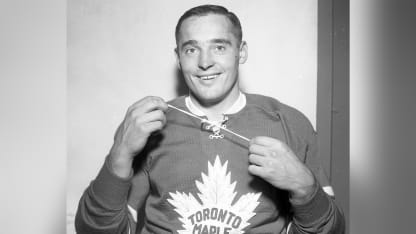
Frank Mahovlich ties the lace of his Maple Leafs sweater in an October 1958 portrait. Michael Burns Sr./Hockey Hall of Fame
But the story doesn't end there.
"Summerville's funeral is held four days later at Toronto's historic St. James Cathedral," Mahovlich says. "The place is jam-packed and someone comes in and whispers in the ear of John Bassett (part-owner of the Toronto Telegram newspaper, who's sitting near the altar). Bassett gets up and walks out.
"There's a buzz in the church. U.S. President John F. Kennedy has just been shot. The whole Maple Leafs team was at St. James when he was assassinated. And we're at the funeral for a charity-game goalie, the mayor of Toronto, whose few great saves were the last things he did in his life."
It's with a quirky statistic that Mahovlich recalls the Stanley Cup titles he won in Toronto in a six-year span. Each time, the city had a different mayor -- Nathan Phillips, Summerville, Philip Givens and William Dennison.
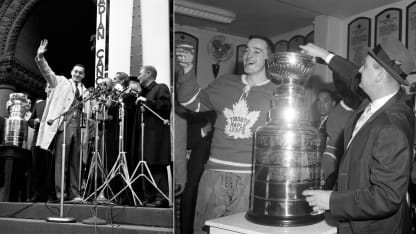
Frank Mahovlich waves to fans from Toronto City Hall steps following the team's April 19, 1963 Stanley Cup parade; with coach Punch Imlach celebrating that victory the night before. Graphic Artists/Hockey Hall of Fame
"Dennison's daughter, Lorna Milne, was with me in the Senate," he says. "I walked into her Ottawa office one day and behind her was a photo of myself with her father and the Stanley Cup at Toronto City Hall after one of our parades."
The Big M's road to those four celebrations began on Jan. 10, 1938 in the northern Ontario mining town of Timmins, born the second child of Croatian immigrants Peter and Cecilia Mahovlich.
He followed his sister, Anne, born not quite three years earlier. Peter Jr. would arrive on Oct. 10, 1946, a future teammate of Frank with the Canadiens from 1971-74 and Team Canada for the historic 1972 Summit Series.
Mahovlich would find his way to Toronto St. Michael's, the academic/athletic hockey factory that was a virtual assembly line of young talent for the Maple Leafs, producing the likes of Turk Broda, Dick Duff, Tim Horton, Red Kelly, Dave Keon and, for Detroit, Ted Lindsay.
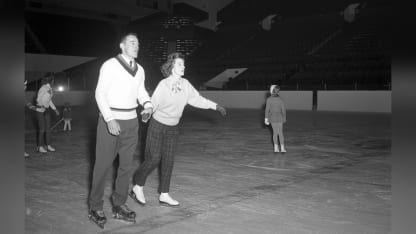
Frank Mahovlich and his wife, Marie, skate at Maple Leaf Gardens during the team's 1962 Christmas party. Michael Burns Sr./Hockey Hall of Fame
Mahovlich remembers first being a Red Wings and Gordie Howe fan, receiving a Detroit sweater for Christmas as a boy.
"I started cheering for Detroit and they started winning -- four Cups in six seasons in the 1950s," he jokes.
Most everyone the Big M skated with became a better player. Howe had never scored 100 points in a season until 1968-69, when he played on a line with Mahovlich and Alex Delvecchio. In Montreal, Yvan Cournoyer scored 47, 40 and 40 goals -- his only 40-goal seasons -- during the three seasons he mostly lined up with the Big M.
Mahovlich's production blossomed once he escaped Toronto, Detroit a springboard to his seasons of 96, 93 and 80 points in Montreal.
Among his memories of his final NHL address was a visit to Montreal's Expo 67, the world exposition, a couple of months after Toronto's upset Cup win against the Canadiens.
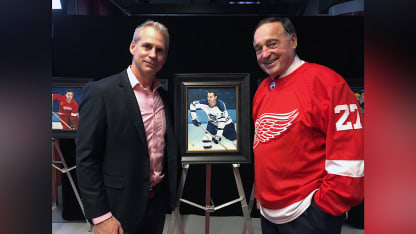
Artist Tony Harris and Frank Mahovlich with Harris' painting of the Big M as part of the 100 Greatest NHL Players project, photographed at Montreal's Bell Centre on Nov. 18, 2017. Dave Stubbs, NHL.com
With many others, the Big M stood in the Telephone Pavilion to watch the revolutionary nine-screen, 360-degree film "Canada 67," a 22-minute dash through the country's first 100 years.
"Suddenly I saw myself racing down the ice, and I was all around myself," he recalls. "It was beautiful. I had no idea I was in the film."
If he sprinted all summer at Expo 67 in a Maple Leafs sweater, it was with the Canadiens that Mahovlich enjoyed his favorite championship.
"No question, 1971 in Montreal," he says of a roster that included 10 Hall of Famers. "The team had missed the playoffs the season before, I arrive in mid-January and they're saying we're going to win the Stanley Cup (which they did). I got to play with my brother. I assisted on Jean Beliveau's 500th goal in his final season. I had a good playoffs (indeed, his 27 points are a Canadiens postseason record which still stands)."
Mahovlich scored his own 500th goal with Montreal on March 21, 1973, coming not quite two months before his sixth and final championship.
He's fiercely proud of milestones of others, mentioning his assists on Beliveau's 500th and Howe's 700th.
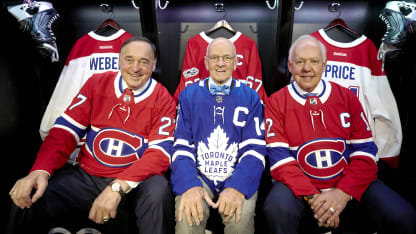
Frank Mahovlich, Dave Keon (center) and Yvan Cournoyer in the Montreal Canadiens' Bell Centre dressing room on Nov. 18, 2017 as part of NHL Centennial-year celebrations. Thierry du Bois/NHLI via Getty Images
"What a goal Jean's 500th was. It was pure," the Big M says of the beautiful three-way passing play with Phil Roberto to Beliveau at the Montreal Forum on Feb. 11, 1971. "I was honored to do what I did in the careers of Gordie and Jean."
His hockey is melded around the loves of his life - his wife, Marie, married 61 years this June, and their children Nancy, Ted and Michael.
Mahovlich doesn't have a single most memorable hockey moment. Rather, it's a body of work that's his greatest source of pride, "all of the Hall of Fame goalies I played against.
"The game is very different now," the Big M says. "I watch my grandkids play now, whizzing around, skating like crazy, working hard, and I'm thinking, 'How did I win the Stanley Cup six times?'
"And then I remember skating and not paying any attention to it. My shoulders would move with my legs and it all felt so effortless."
Top photo: Frank Mahovlich with a miniature Stanley Cup, one of six representing his career championships, at home in Toronto on April 19, 2023. Dave Stubbs, NHL.com
